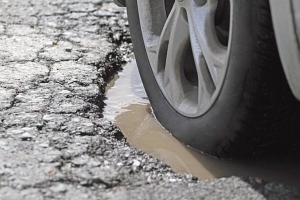Test Owner
Doncaster Sheffield Airport Revival Set to Boost Economy and Haulage Sector
The planned reopening of Doncaster Sheffield Airport is expected to drive major economic growth in South Yorkshire, with the haulage industry set to play a vital role in its redevelopment, according to the Road Haulage Association (RHA). The Department for Transport has said the airport project could generate 5,000 jobs, inject £5 billion into the economy, and bring wider benefits worth £2 billion by 2050.
The airport, which closed in 2022 after 17 years in operation, is now being brought back to life with the support of devolved funding. Transport Secretary Heidi Alexander hailed the move as a key part of the government’s plan to stimulate regional prosperity, adding, “I’m delighted to see South Yorkshire investing in its future and can’t wait to see flights return to the skies.”
James Barwise, policy lead at the RHA, welcomed the decision and highlighted the crucial role the logistics sector will play: “The redevelopment of the airport and its infrastructure offers long-term opportunities for both businesses and communities,” he said.
However, Barwise also stressed the urgent need to address driver shortages, warning that an additional 40,000 lorry drivers will be needed annually over the next five years to meet demand and support continued economic growth across the UK.
Weight Limits to be Introduced on M48 Severn Bridge Amid Safety Concerns
A new weight restriction is set to come into force on the M48 Severn Bridge from 27 May, following inspections that revealed deterioration in the structure’s suspension cables. National Highways has announced that vehicles over 7.5 tonnes will be banned from using the bridge for safety reasons, with the measures expected to remain in place for up to 18 months.
While emergency services, buses, coaches, gritters, and recovery vehicles will be exempt, most HGVs will be diverted to the M4 Prince of Wales Bridge. This move affects around 10% of the bridge’s daily traffic – around 3,270 heavy vehicles. National Highways said the bridge remains safe but wasn’t built to handle the weight and volume of modern traffic.
Local councillors have voiced concern about the impact on businesses and communities. Councillor Lisa Dymock said firms in her ward that rely on the M48 face rising costs and logistical challenges. Delays caused by ongoing M4 roadworks and potential diversion routes of up to 95 miles are also fuelling worries.
National Highways is now working with hauliers and stakeholders to manage the changes. The recent cable assessments, finalised in late 2024, confirmed significant deterioration in cable strength, prompting the precautionary restrictions.
Green Light Given for UK's Longest Road Tunnel in £9bn Thames Project
The government has given the go-ahead for the construction of the UK’s longest road tunnel, as part of a £9bn infrastructure project aimed at easing congestion in the South East. The Lower Thames Crossing will connect Tilbury in Essex with Gravesend in Kent, featuring twin tunnels running beneath the River Thames to reduce pressure on the Dartford Crossing by an estimated 20%.
Spanning 14.5 miles (23km), the route will link the A2 and M2 in Kent with the A13 and M25 in Thurrock. Of the total route, 2.6 miles (4.2km) will be underground. Construction is expected to start in 2026, with completion targeted for 2032. The scheme, first proposed in 2009, has already cost over £1.2bn in planning and consultations.
Dartford MP Jim Dickson hailed the announcement as long overdue, calling it a solution to the “gridlock” suffered daily by local residents. However, not everyone is convinced. Environmental groups and local campaigners have voiced serious concerns about the project’s ecological impact, especially on ancient woodland and greenbelt areas.
While the full funding model remains undecided, the government confirmed that public investment will support early utility works, with private finance expected to play a major role. National Highways has described the development as a transformative step towards safer, more efficient road travel.
DPD Trials New Electric HGVs as It Accelerates Towards Net-Zero
DPD is taking another step towards greener logistics with the launch of real-world trials for a new electric heavy goods vehicle (eHGV) developed by MAN. The vehicle, known as the MAN eTGX, will operate from DPD’s Hinckley hub and features a range of up to 500 miles and a rapid charging capacity of up to 750 kW.
Following extensive driver training, the eHGV will be trialled on a live DPD route, pulling a standard trailer to test its suitability for everyday operations. This move builds on DPD’s previous sustainability efforts, which included converting 95% of its 1,600-strong HGV fleet to hydrogenated vegetable oil (HVO) in 2023 - cutting emissions by 83% compared to diesel.
DPD has long utilised double-decker trailers to boost efficiency and reduce vehicle numbers on the road. The company is now working closely with MAN to develop an electric truck capable of hauling these larger trailers, with the first model expected to be tested later this year.
With over a third of its van fleet already electric, DPD remains committed to reaching net-zero by 2040. Tim Jones of DPDgroup UK confirmed that the company is on track, having already cut emissions by 47.5% since 2020, and continues to push forward with both HVO and electric innovation.
Royal Mail Hits 90% Automation Milestone in Parcel Network
Royal Mail has announced a major leap forward in its transformation journey, confirming that 90% of its parcel operations are now automated. The company hailed the achievement as a significant boost to efficiency and customer service, marking a new era for its delivery network.
This success follows significant investment in technology, including the launch of two advanced parcel hubs in Warrington and Daventry, which together can handle up to 1.5 million parcels daily. Additional upgrades include ten new conveyors for large parcels at mail centres nationwide, and high-speed sorting machines in Leeds, Plymouth, and Exeter - each capable of processing an extra 21,000 parcels per hour.
To further streamline services, Royal Mail rolled out an updated app in March 2025, allowing customers to receive proof of postage when using barcoded labels at one of the UK’s 115,000 post-boxes. The firm has also introduced digital tracking to its transportation containers and added barcodes to stamps, enhancing traceability and tackling counterfeit issues.
Royal Mail’s Chief Operating Officer, Alistair Cochrane, called the automation milestone a “crucial step” in building a smarter delivery network. He emphasised the company’s ongoing commitment to adopting new technology to meet rising expectations while equipping staff with the tools to work more effectively in a fast-moving logistics landscape.
HGV Skills Bootcamps Drive Progress, but Future Funding in Doubt
Since its inception in 2021, the Department for Education’s HGV Skills Bootcamps scheme has helped thousands take the wheel of a new career. By February 2025, over 3,400 people had completed HGV training through HGVC-led Bootcamps, with nearly 2,700 securing job offers. The initiative has seen strong uptake from businesses too, with 965 employers - predominantly small and medium-sized enterprises - taking part.
Beyond addressing the UK’s critical driver shortage, the scheme has also improved diversity within the industry. Around 10% of applicants were women and nearly a quarter came from Black, Asian or minority ethnic backgrounds, a notable shift in a sector historically lacking representation. Roughly a third of trainees were under 36, highlighting the programme’s success in drawing younger recruits.
Skills Bootcamps, lasting up to 16 weeks, provide tailored training and are heavily subsidised depending on employer size. Smaller firms receive 90% funding, while larger organisations get 70%. Businesses can also train recruits before employment, easing entry into the logistics sector. James Kemball’s Compliance Manager, Adrian Gray, praised the scheme as a smart, cost-effective solution to workforce gaps.
While the programme’s impact is clear, concerns remain. HGVC CEO James Clifford warns that without continued funding past 2025, the UK may again face HGV driver shortages—an issue that still threatens supply chains and the wider economy.
Councils Face Funding Cuts Without Transparency on Pothole Repairs
English councils will soon be ranked on their pothole repair performance, with those failing to publish detailed progress reports at risk of losing millions in road funding. The Department for Transport (DfT) is offering a £500m boost to local authorities from mid-April, but 25% of this funding will be withheld unless councils submit annual updates on their road maintenance efforts.
Prime Minister Sir Keir Starmer confirmed a new red-amber-green (RAG) rating system will track how effectively councils are addressing potholes. He said the aim is to bring greater transparency and end the "postcode lottery" of road quality. The move comes as data from the RAC shows an average of six potholes per mile across England and Wales.
While the government insists the plan promotes accountability, local leaders and opposition parties have criticised it. The Local Government Association (LGA) said the funding falls far short of what’s needed, with one council reporting a £410m shortfall. Critics also argue the focus should be on long-term preventative maintenance, not quick fixes.
Transport Secretary Heidi Alexander defended the policy, saying most councils should meet the requirements. Authorities must report spending, pothole numbers, and future plans by June, and show community consultation by October - or risk losing a quarter of the promised funding.
DVSA Announces Major Changes to Vehicle Inspection Rules from April
The Driver and Vehicle Standards Agency (DVSA) has confirmed a range of updates to its inspection manuals, with new regulations coming into force from 1 April 2025. These changes will directly affect HGV drivers and public service vehicle (PSV) operators across the UK, with the aim of improving vehicle safety and inspection clarity.
Among the most significant changes are revised rules on side guards, now requiring certain tank vehicles carrying fluids to be fitted with compliant guards “so far as is practicable”. A new exemption list applies to vehicles first used from April 2025, including articulated tractor units, gulley emptiers, car transporters, and some category T vehicles. The manual also features new imagery for side guard inspections and guidance on blind spot radar devices installed in guard gaps.
Visibility standards have been updated to reflect the growing use of monitors and camera systems in place of traditional mirrors. The manual now outlines when and how these systems should be assessed, depending on their function.
Further changes affect fuel tank inspections, now expanded to include hydrogen fuel cells, with clear procedures for checking LPG, CNG, and LNG tanks. Brake pipe regulations have also been updated, setting a new threshold for wall thickness deterioration to help identify serious safety concerns.
Heathrow Shuts Down After Substation Fire Sparks Widespread Chaos
Heathrow Airport has closed all operations after a major fire at an electrical substation in Hayes, west London caused a significant power outage. The fire broke out just before midnight on Thursday, with emergency services called to Nestles Avenue at around 23:23. Though the blaze was brought under control by early Friday morning, the damage disrupted power supplies to Heathrow and surrounding areas, including the failure of the substation’s backup systems.
As a result, Heathrow confirmed it would remain closed until at least 23:59 on 21 March, with no clear timeline for full power restoration. More than 1,300 flights have been affected so far, according to Flightradar24, with many aircraft cancelled or diverted mid-air. Travellers have been urged not to go to the airport and instead contact their airlines for the latest updates.
Airlines including British Airways, Virgin Atlantic, and United have grounded multiple flights, while Qantas and Cathay Pacific have diverted some services to other European cities such as Paris. Amsterdam’s Schiphol Airport has also reported cancellations for flights to and from Heathrow. Gatwick Airport has said it stands ready to support where needed.
The power outage has affected over 16,000 homes across west London, with around 4,900 still without power, according to energy suppliers. Heathrow Express is running a reduced half-hourly service, and several roads near the substation remain closed. The airport has apologised for the disruption and provided a helpline on 020 8757 2700.
£250,000 Safety Upgrades Introduced at M1 Service Stations
New security measures worth £250,000 have been installed at Watford Gap and Northampton Services on the M1 to improve safety for drivers. The enhancements include advanced automatic number plate recognition (ANPR) systems, additional CCTV cameras, and upgraded fencing. Funded by Northamptonshire’s Police, Fire and Crime Commissioner (PFCC), the improvements aim to create a more secure environment and deter criminal activity at these busy service stations.
Roadchef, the company that owns both sites, welcomed the investment, stating that the upgrades would provide greater security for those stopping at the services. Watford Gap Services, which opened in 1959, has a rich history, once serving as a popular meeting place for musicians, including The Beatles and Jimi Hendrix. Meanwhile, Northampton Services, formerly known as Rothersthorpe, was initially planned as the UK’s first service station but did not open until 1979.
A Crimestoppers campaign has also been launched to raise awareness among drivers about vehicle security and how to prevent theft. Information will be shared through leaflets and display boards, encouraging motorists to take precautions against potential crime.
Northamptonshire’s Police, Fire and Crime Commissioner, Danielle Stone, highlighted the importance of these upgrades in making the service areas safer. She emphasised that deterring criminal behaviour would allow police officers to focus more on community engagement, ensuring they remain visible and accessible to the public. Roadchef’s Darrell Wade also praised the improvements, describing them as essential for enhancing driver safety and security.















